The social consequences of the architectural decisions that will take us into a future of openness in immersive software are potentially vast. Open immersive software is poised to begin to play a disruptive role in the next generation of the internet, and decisions about its design may turn out to be very important ones for all of us.
EbenMoglen Euler the Second Life avatar of Eben Moglen of the Software Freedom Law Center), and Zero Linden (Mark Lentczner, Linden Lab), Neas Bade (Sean Dague, IBM, Linux Technology Center), and Zha Ewry (David Levine, IBM Research) met in Second Life last Sunday to discuss crucial issues of open architecture for immersive software in a discussion on Intellectual Property and Privacy/Identity in Open Virtual Worlds facilitated by John Jainschigg and I that kicked off Life 2.0 Summit Spring ‘08 (more details on the panelists here).
It was, I think, a landmark conversation. And, with the permission of United Business Media, here is an exclusive first chance to hear it, if you missed the live event Sunday.
Audio here, © United Business Media.
Picture below of the panel members from left to right, Tara5 Oh (moderator), Zero Linden, EbenMoglen Euler, Neas bade, Zha Ewry, and John Zhaoying.
Open Virtual World platforms are just beginning to get on the radar. But open software is clearly the path to the future and as Philip Rosedale (founder of Linden Lab) has said several times re the complete opening of Second Life software (the client is already open), “Only open will win!”
In two weeks, I will be part of a round table at Virtual Worlds 2008 in the new enterprise track. This round table aims to give people an opportunity to see a variety of implementations of open source virtual world platforms and to learn a bit more about the individual platforms presented, and what they are trying to achieve. Adam Frisby of OpenSim, Nicole Yankelovich of Sun’s Project Wonderland, Jani Pirkola of RealXtend, Remy Malan of Qwaq will be the co-facilitators
Avatar Rights!
At the heart of the discussion with Eben Moglen about freedom and openness in immersive software were some propositions about avatar rights. And, as Zero Linden explained, the new open architecture of the next generation of the Linden Lab grid crucially separates avatar identity from what constitutes their environment. Separating the production of identity from the material substrate is, Eben Moglen explained, at the core of avatar rights. (For a technical view of the next generation of architecture for Second Life see the first draft of Second Life Grid Open Grid Protocol a.k.a. SLGOGP, and for more on these protocols see Tao Takashi’s (Christian Scholz in RL) blog. where the stream for yesterday’s Architectural Working Group 2 meeting held in Second Life is posted.)
Pictures below of Zero Linden (left), Second Life avatar of Mark Lentczner (right), Linden Lab.
Eben Moglen put the fundemental issue of rights in immersive software very eloquently at the start of the discussion. I have transcribed the beginning of this discussion but to see how the thoughts developed through an in depth probing of the issues, you will need to listen to the audio here.
Eben:
I think we have an interesting and powerful problem to put our minds to with respect to want it means to think about freedom and openness in immersive software. The free software movement which I spent a lot of time trying to understand and in trying to assist took for granted that the person who needed to have rights in software was the person who got a copy of a binary, and that his rights in the binary should include the right to understand, and to study, which implied access to the source code, to modify, improve and share.
Now the reason for getting into OpenSim and open virtual worlds is to achieve some of the same kinds of social consequences that the free software movement was trying to achieve including innovation that can be shared by everybody that innovates and the value of technology in commons. But, because this software is immersive software we have another set of values to take into account which are closer to rights for users who don’t have a copy of the binary, or at any rate, whether they have a copy of the program on the client side and may posses some of the code derived from the server is sort of less important than the fact they are inside the software and if they are not free inside the software, they are substantially unfree.
That led me to ask some questions about what it means for an avatar to exist as a beneficiary of the freedom that the user is supposed to get in relation to software. It seemed to me that from there one could begin to try to deduce some rules about how the open virtual worlds have to operate. The most important one seemed to me to be that there is a right to continuity. To have the avatars existence and accumulated experience trapped inside one Terms of Services contract raises the the possibility of what lawyers call unconscionability. That after a while you have so much accumulated value in the avatar that the Terms of Service can be changed on you in a way that you can’t very well resist.
That implied, it seems to me, that if the spaces in the virtual worlds are to be regarded as open they have to be contractually open. It has to be possible to move between them without being artificially constrained by Terms of Service Agreement. That also seemed to me to imply something about the question of what it was one carried from place to place. And it seemed apparent to me that in the process of traveling from place to place an avatar has to carry some rule set as was true in many parts of the world before the modern era of the Nation State. The law that you obeyed traveled along with you. And it seemed to me that we were talking about a situation very much like that.
If you move an avatar in open virtual space from one part of the grid to another or from one grid to another governed by different servers one is not in a position to be asked to surrender ones’ sense of fairness or ones’ understanding about what can be done as a consequence of standing in a particular place. And so I reasoned my way to the conclusion that we had to provide an infrastructure for both declaring persistent preferences and expectations with respect to treatment.
Those were the lines of thought which led me to the propositions that Tara5 explained. And they seemed to me merely propositions in search of simplification. I feel as though I’m looking for some axioms, like Richard Stallman’s four freedoms in the free software movement’s genesis to explain what it is that we need to do as we open the space up.
Zha Ewry:
Reacting on that just a little bit, one of the things that came to mind when I heard Eben talk back in December is something Zero actually said when we did the kick-off, back in I guess September now, for the Architecture Working Group and some of the inter-op work which was, he used a phrase I liked a lot which is “an avatar bill of rights.” It’s what are the expectations an avatar should have in a virtual world. I thought that was a very compelling way of expressing it.
Zero Linden:
I believe at the initial Architecture Working Group which is Linden Lab’s sort of open forum for developing an open protocol set we used the term – looking for “an avatar’s bill of rights.”
I think I would respond to those two thoughts that are quite good. In one case I can give you a different approach for why we came there, and the other I can give you a simplification, which I think you’re looking for. In the first case, when I looked at viewing what would have to exist in an open virtual space, and the value of immersion. Strictly looking at it from the point of view of what made this space work. Granted here I’m a technologist not a lawyer so I’ve perhaps a different view, but surprisingly the same conclusion, is in fact the ability for you to identify and for you to to associate so closely with your avatar that led me to posit as a fundamental aspect of how we build this future open protocol that you must think of it as avatar portability.
It must be a fundamental right that users are in control of their identity not the services which help provide the existence and the immersion. That’s pretty radical thought actually, at least in terms of technology, because it is so much easier to architect, and so much more quote unquote natural to build systems which work another way. Witness every single web-site where you create your own account on every single web-site, it’s much easier for each web-site to do that than it is for web-sites to understand that they somehow agree to opt into a protocol in which you can control your identity.
In virtual world services, we have to have a world in which your avatar and your identity are in control of the user not matter what the service provide is. So what is going on in the AWG and the structure of the future protocol is the surprising separation at the server side, at the internet side, of those services that provide aspects of you identity. And by separating those out, and by building the entire protocol based on a mutual understanding between those two sets of servers, we enable users to choose servers to represent their identity that meet with their needs, trusts and ideals and to still interact with other servers that provide land with other things.
Right now when we are standing on this piece of land, the server we are standing on is both providing our identities as well as providing the land. And if you come to visit this piece land you basically have to trust what this server decides your avatar can do. In the future open that we are deciding we separate those notions. There is a server which represents your identity that you have chosen, and there is a server that represents the land that the landowner has chosen. And, we embed in those systems the negotiation between them.
Eben:
That is beautifully elegant, I have to say. That does indeed make an enormous difference………(to continue please go to the audio here).
Also see Sean Dague’s (IBM and OpenSim) interesting post on his blog that highlights one of the key freedoms Eben discussed – the freedom to leave.
“freedom to leaveâ€, an open-standards based assurance that users can move their data easily between interoperable platforms and services.
Sean notes:
Today, if you decide to leave any virtual world platform (even OpenSim), you pretty much have to leave you data behind. I think that one of the features people will be looking for in the virtual worlds of tomorrow is the same freedom to leave that they get from any standard web or mail infrastructure provider today. Part of what has made Google successful in the application hosting space is by ensuring it’s easy to leave the platform.
One of the biggest reasons I left LiveJournal was that it was hard to leave, and the longer I built up content in that environment, the harder it was going to be for me to get it out.
Also see the coverage of the panel at SLNN.
Mitch Kapor – Second Life 2.0
In his keynote at Life 2.0 Summit Spring ‘08, Mitch Kapor predicted that virtual worlds will become a very important part of corporate strategies for adapting to a world defined by global warming. Kapor the recent board chair of Linden Lab (now a board member), chair and founder of the Open Source Applications Foundation; co-founder of the Electronic Frontier and Mozilla Foundations; and the creator of Lotus 1-2-3, the spreadsheet that revolutionized enterprise computing in the 80s spoke about his current work to enhance the user interface for virtual worlds, which he likened to being in the DOS stage now. His vision to make virtual worlds useful and accessible to all is backed by work on in his own lab. He noted that videos of some of these experiments will be available on You Tube in a couple of weeks. See Hiro’s epic post for more. Kapor also made some comments re the open sourcing of virtual worlds.
I am personally very encouraged at the progress being made with OpenSim and open source components of a virtual world eco-system- some people inside the company at Linden may feel threatened by this. But my personal view all along is the most important thing that can happen is to have the largest most vibrant innovative ecosystem for virtual worlds as possible. And that means something that is open and interoperable. One wants to have the biggest pie not a little slice of a small pie. And similarly I know that there are a lot of people interested in avatar portability or open avatar in the company.
This last remark I think is clearly supported by the number of Lindens that came to the annual open Architectural Working Group meeting. I attended and there were indeed a bunch of Lindens present. The picture below is from Tao Takashi’s (Christian Scholz in RL) blog.

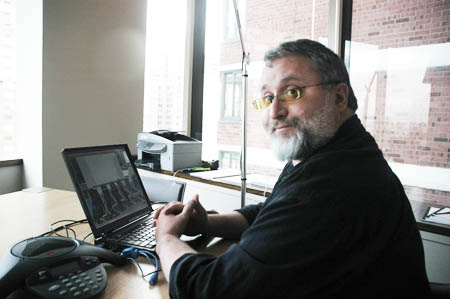
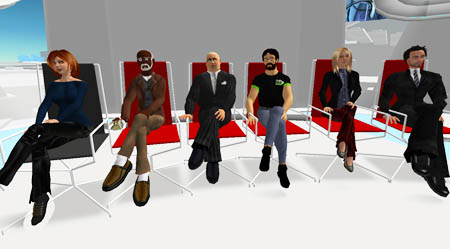
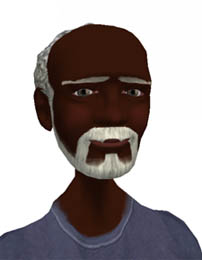
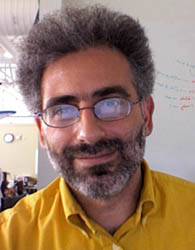
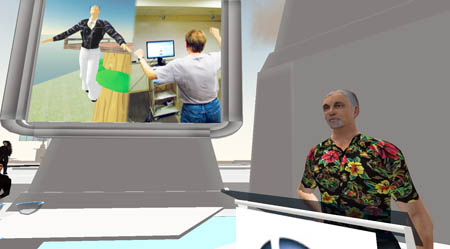
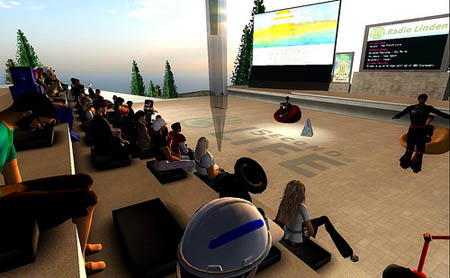
March 20th, 2008 at 1:50 am
There is so much that is profoundly troubling here.
Number one, there’s the glaring problem that keeps happening, to which I’ve addressed many blogs before, which is that the Architectural Working Group and Zero Linden and his followers keep taking on all kinds of huge social and political and civic issues, like here, even avatar rights (!) *and deciding them* without the wider community, or even the sort of “intelligentsia” of the blogging public of SL. How can this be? From the outset, this group purported to be “just a technical group” and its documents “oh so technical,” and in office hours, brusquely dismissed anybody with non-technical concerns. Yet under the guise of “just making the software,” of course they are profoundly, profoundly taking control with only their ideas, unquestioned by any kind of participatory and democratic debate.
Having a handful of coders decide in “democratic centralism” isn’t *liberal* democracy.
This idea that the revolutionary avant-garde gets to craft the notion of the human being in digital manifestation , and if you didn’t get to the laggy sim on the right office hour or Life 2.0 you missed it, is all wrong. There’s no sense of “This is a draft, what do you think.” It’s more like “Here is the truth, as it has been revealed to me, and thus it is written…”
The very obvious objection anyone reading this from the non-technical but humanities perspective would say is: but people are endowed by their Creator with certain inalienable rights. That is, it isn’t up to a game god and coder to say, “Well, we’ll decide to have material dictate consciousness or have consciousness dictate the material” (that’s essentially the discussion dressed up here as “the environment and the avatar are separate). And even if this contemplation weighs in on the side of allowing (because that’s what it is, the coder “allowing”) the individual his individuality, there’s a credibility gap — who is the coder, after all, but just another member of human society that does live (and die) outside of the code?
There is a basic premise to be debated here, unfortunately, and not taken for granted.
And that is that avatar rights do not spring from coders ceding them. They do not spring from software. They do not spring from platforms. They are not made by coders; they can only be reflected, enhanced, or obstructed by coders.
The architecture cannot contain human/avatar rights; if it does, they are not rights but a misleading simulation.
Avatar rights are human rights, and human rights, as it was famously enshrined at least in the US (and in other similar ways nodding to universality and the rule of law in other parts of the world), are endowed by their Creator (let’s not get too bogged down here in whether that is a traditional God, a higher being, or what it is, and hope it can be understood as “something higher than one mere mortal man”)
You might think that the coder can stand in here for the Creator, not only by analogy, but by functionality. I beg to differ. This is social software. We are indeed inside it. I’ve always been saying for years “we’re soaking in it.” And that means its actions upon us and our interactions with it become a kind of property, a kind of virtualized but still real property that is not the coder’s. Our table, purchased in a store, is not his, even if he designed it, on a platform made by coders.
This is a very important concept to get across to Zero Linden and his followers who is airily making these decisions without us. There is a whole debate to be had about whether individuals, avatars, in Second Life even *want* to walk to other worlds. That debate just isn’t even *happening* in Second Life. There is a whole discussion to be had about how their stuff, their intellectual property, their integrity are to be ensured.
There is the entire *political* discussion to be had about separation of powers. Linden Lab could open source, and yet never separate powers, that’s the awful thing to contemplate.
Some of what Zero is saying sounds as if he is attending to the notion of the persistence of the individual, but given the process by which he is arriving at these notions and articulating them (a closed one, among coders in his group), I really have to question what ideologies might lie underneath it.
What houses avatar rights? What is the foundation of avatar rights? It is not the code. Code-as-law is a very mechanical, even harsh thing, and making it into streaming 3-D interactive software hasn’t softened its sharp edges. Avatar rights must always lie outside the code, even if avatars themselves are human beings manifesting inside avatars. I’m not saying that there can’t be any discussion about avatar rights because they are already human rights (this is a position some are taking). I’m saying avatar rights are most emphatically important as a separate topic, and are linked to human rights that ought to manifest in these worlds as they manifest in real countries.
Oh, sure, I realize you want to keep a special shelf in the edifice called “artificial intelligence” and there’s even been a horrid blurring of the concept of the avatar-as-individual in this structural discussion (and in the working blueprints) by having “collective” or “Group” avatars that can house organizations or wikis (sigh) . But these are merely what coders code it to be, like bots, it is an extension of their ideas by mechanical force, and should be marked as such. There is always a set of individuals or an individual behind every bot and group, and you shouldn’t lose sight of that.
So much stress is placed on the forced-migration policy that is usually what stands in for “freedom to leave” that some of the ramifications aren’t being considered here. What does this mean, the right to have all your data removed?
If I bought your script or your chair or your land or your house, and you leave, you take it all with you? Why? Because it is your intellectual property that I only rent? but why? Nobody would treat a CD that way. Surely you don’t mean to suggest that leaving Facebook, my gift of a birthday present is wiped out, as if it had never been.
There is so much to be said here, and I can only urge Linden Lab: put as much high profile attention to the problem of how to “open source” civic and political issues as you are to these “architectural engineering” matters; these issues have to be understood as being part of human life not subserviant or dependent upon code.
March 20th, 2008 at 1:56 am
will we carry our identity (servers) with us in the future?